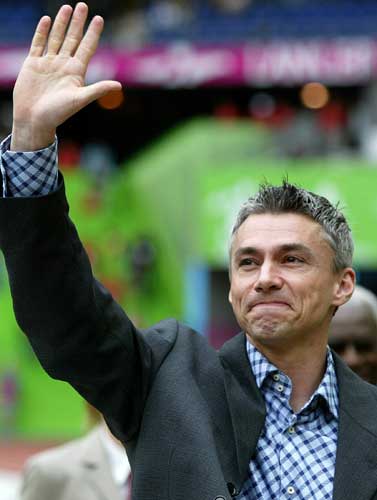Passed/Failed: An education in the life of the broadcaster and Britain's most successful medal-winning athlete Jonathan Edwards
'I was a late developer physically'

Jonathan Edwards, 42, is the triple jumper and later athletics commentator. During the 1995 World championships he broke the world record on consecutive jumps, becoming the first man to jump both 18 metres and then 60 feet. In March he launched the "Personal Best" Scheme which provides skill-training programmes, for unemployed people in the north-east, plus the possibility of voluntary work at the London Olympics and Paralympics.
Being a Christian and with a father who was an Anglican minister, I wasn't exactly the coolest kid in town! But I have no negative memories; it was exciting to live in big vicarages with a lot of people around, like missionaries with interesting stories and musicians who played in the church. I was always good at sport, which helped me get in with the crowd. Once I got into the football team, that was it.
I was always timid about going to school, although once I was there I was fine. Inverteign Junior School in Teignmouth, Devon, was open-plan and that didn't work for me. I liked the idea of boundaries and I didn't like the fact that the classroom had no walls.
We moved around at lot and when I was 10 my father became a vicar in Ilfracombe, Devon. I loved West Buckland, a big private school in the countryside. The teaching was excellent and I thrived; it was everything an education should be.
The first time I jumped was at West Buckland. The triple jump is a different from the long jump. It is a hop-step-and-jump and the physiological demands suited me better than the long jump. I came first in my age group at school but didn't qualify for the county until I was 17; I was a late developer physically and very small.
I got eight O-levels – maths, physics, chemistry, French, German, two English and Latin – but no RE. I got my religious teaching from church and Sunday school. For some time I didn't compete in athletics meetings on a Sunday and so missed out on the 1991 World Championships. (Later I was to change my mind on that; I have subsequently lost my faith.)
My A-levels were a mix-and-match: maths, French, physics and general studies. There is a real beauty to maths and I liked the certainty of science; you wrote an answer, drew a line under it and that was it. You got on with the next question. By contrast, arts subjects are less clear-cut, and the answers more subjective. Maybe that's why I didn't like the open-plan layout of my junior school!
I did a physics degree at Durham University and got a 2:1. I loved it there. I had a very happy time and it is a lovely city. I still did athletics but you have to make more of an effort when you're by yourself, whereas at school it's provided for you. Athletics is an individual pursuit, not a team sport, and there's more of a lonely aspect to it. Without my father's encouragement, I would probably not have become an athlete after Durham.
Now I would prefer to do something more philosophical but physics was a good degree to get. It helped me to understand the mechanics of jumping: moments of force and rotation. Testing a theory, revising it. Did the theory work? It's all part of the scientific method. It worked for athletics but now I've retired I'm finding out that life is more open-plan.
Subscribe to Independent Premium to bookmark this article
Want to bookmark your favourite articles and stories to read or reference later? Start your Independent Premium subscription today.

Join our commenting forum
Join thought-provoking conversations, follow other Independent readers and see their replies